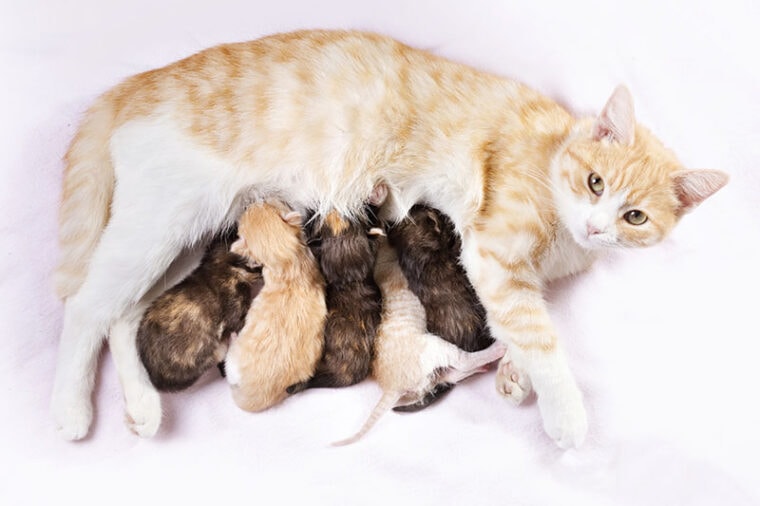
Click to Skip Ahead
Mammals have varying gestation rates and reproductive timelines based on species. Some take a very long time to have another cycle, while others can get pregnant right away. So exactly where does a cat fall?
Maybe your lovely cat just had a litter of unexpected kittens, and you want to ensure you can get them to the vet for spaying before any more accidents happen. Here we will go over exactly how feline reproduction works so you can make the decisions in a timely fashion.

Cats Can Get Pregnant Almost Immediately
Once your female cat delivers her litter of kittens, she can get pregnant as soon as a few weeks after giving birth. Lactation (nursing) does not prevent a heat cycle, and if a cat is mated while she is in heat then she may become pregnant again. Prolactin, which is a hormone released when nursing, may suppress ovulation a little bit, but pregnancy is still very possible.
Because the timeline is so soon, keeping her away from any unneutered males and discussing with your vet the best time for spay surgery is imperative. Not only can your cat fall pregnant again, but they can also contract diseases or experience high levels of stress around other cats.
If you’re already past that point, you might wonder exactly what to expect with this litter of kittens and how to tell if your cat is expecting another.
Let’s discuss the different aspects of cat reproduction so you can speak with your vet about options when the time comes.
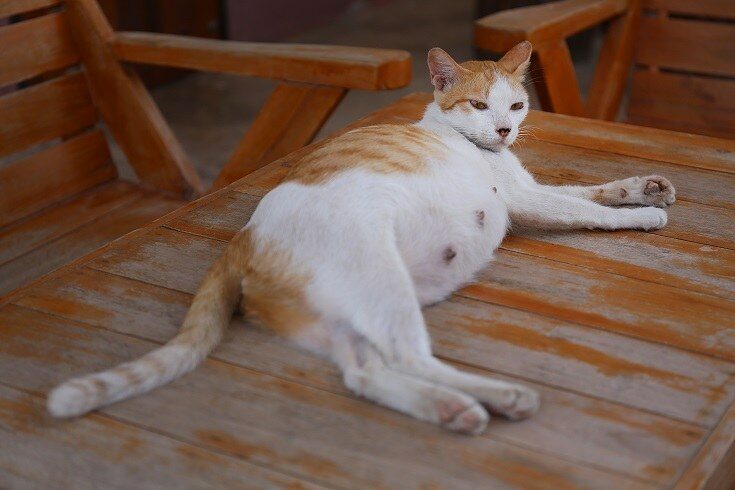

Signs of a Cat in Heat
If your cat already had a litter of kittens, you’re probably familiar with heat cycles. But in case you missed it the first time around, there are undoubtedly bodily cues to look for.
Spotting a cat in heat can happen from a mile away. These vocal, excessively affectionate females can be easy to identify. But if it’s your first time experiencing it, here are some signs you might notice.
Unlike dogs and humans, cats do not bleed during cycles. Heat cycles can seem like they last forever. They can range anywhere from 1 to 21 days, but the average is around 7 days. In a single breeding season, a female who has never been spayed can go into a heat cycle two to four times.
Generally, this happens between February and October. So, if your cat recently gave birth to a litter of kittens, and you feel like she’s in heat again, it’s extremely likely. If she has already entered a new cycle, keep her away from any unaltered male until the cycle passes and contact your veterinarian right away to potentially schedule an appointment for spay surgery.
How to Tell If a Cat Is Pregnant
If your cat recently had kittens and you know she has had another heat cycle, you might worry she is pregnant now. So how can you tell? Some females can show no symptoms, while others are far more obvious. If your cat was recently pregnant, they will likely exhibit a lot of the same traits it did the first time around.
Here are some signs to help identify if your cat is pregnant:”
Only your vet can determine if your cat is pregnant in the early stages, until they start visibly showing.
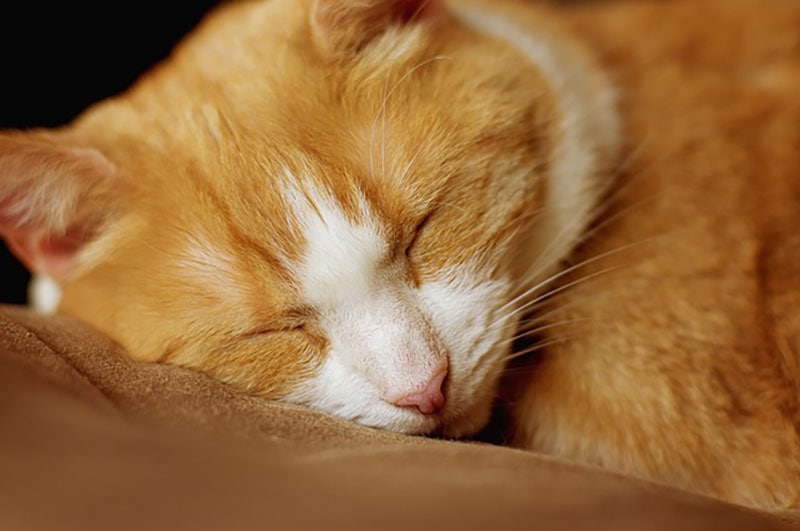

After Care for Kittens and Mother
After the mother cat gives birth to her litter, it is important to leave them alone to get acclimated. The mother is going to need to recuperate from a long labor and get the kittens cleaned up and well-fed.
If you let the mother cat do what is instinctual to her, everything else should flow pretty beautifully.
When Should You Call the Vet?
Most of the time, cats have kittens without an issue.
If you notice any odd behavior, the sooner you respond, the better. The aftermath could be something simple and easy to fix or as dangerous as a kitten stuck in the birth canal. Always take care of potential issues in a timely fashion.
When Can You Handle Newborn Kittens?
Newborn kittens are very delicate, just as the mother’s well-being is during this time. Touching them before they reach a week old is not a good idea. Once they turn a week old, you can start handling them one by one for equal time.
It is crucial to start handling kittens early so they acclimate well to people. If the mother cat seems very stressed out or is showing obvious signs that she doesn’t want you handling her kittens, it’s best to respect her space.
She is likely dealing with hormones and protective instincts that come naturally to her. Mother cats start leaving their kittens alone for longer intervals between checking on them, so you can always take 5 minutes to pick up and handle the kittens when the mother is away.
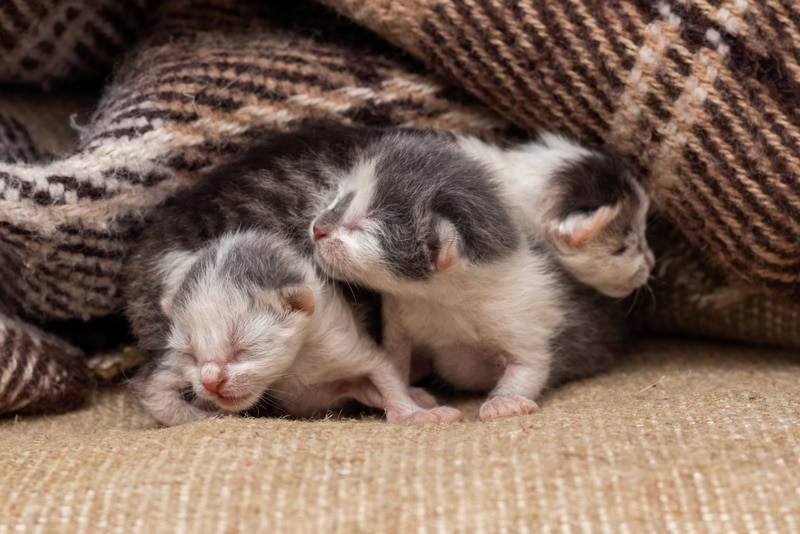
When Can You Wean Kittens?
Kittens are ready to start the weaning process between 3 and 4 weeks of age. They are ready to start the transition to solid food. It is important to introduce solid foods slowly so both the mother and the kittens can adjust to the change. Initially, you’ll want to soften the food to make it easier for them to eat.
After all, going from drinking their mother’s milk to chewing hard kibble can be a little difficult. You can gradually introduce more and more solid food. By 6 to 8 weeks of age, the kittens should be fully weaned and ready to go to their respective homes.
When Can You Rehome Kittens?
Ideally, you should never re-home kittens before they turn 8 weeks old. This time gives them adequate space to grow, learn, and socialize with their littermates. This will also ensure that they have well-formed personalities and a clean bill of health.
You should always vet the kittens before they go to their respective homes. That way, you’re giving your kitties a fantastic start in life. Screening potential owners is a must! Many folks want cats but aren’t necessarily good candidates to have them.

Spay Surgery
Spaying or neutering kittens before they go to new homes is not customary. However, if you plan to keep them for a few months before finding them a home, it is a nice safety measure to put in place to ensure they don’t go out and start reproducing right away.
Most veterinarians recommend getting a cat spayed or neutered before they turn 6 months old. If you wait longer, they could peak in sexual maturity and start undesirable behaviors like heat cycles and spraying.
For a female that has recently had kittens, spaying is usually undertaken when the kittens are weaned at around 6-8 weeks. Speak to your veterinarian for their recommendations on timings of spaying after giving birth.
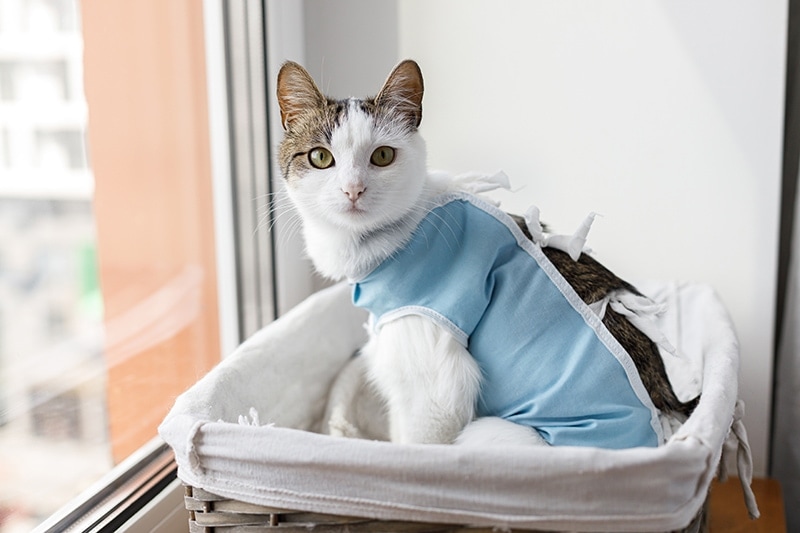
Can You Spay a Pregnant Female?
If your female has fallen pregnant, she can still be spayed. As the surgery involves aborting the developing kittens, it is a controversial topic.
We will not condone nor condemn this choice. Ultimately, if your cat has fallen pregnant again, you and your veterinarian must determine both options’ benefits and risks.
Benefits of Spaying Your Cat
The benefits of spaying and neutering cats far outweigh the risks.
Reasons Not to Spay Your Cat
The main reasons not to spay or neuter your cat is if you want them to breed or if they have an underlying health condition that causes them to be at increased risk of anesthesia and surgery.
Other less troubling postoperative complications include inflammation, infection at the incision site, reopening of the incision, swelling.
These problems are generally uncommon and often avoidable. Fear of these complications should not prevent you from spaying your cat.

Homelessness Is an Epidemic
The number of homeless cats in the United States alone was a staggering statistic. There are an estimated 30 to 40 million strays (but it may be higher), all of which are uncared for cats. This is a heartbreaking realization. Not getting your cat spayed or neutered can just influence the ongoing cat homelessness epidemic.
Of the 2.7 million animals euthanized every year, 1.4 million of these animals are cats. That is an astronomical number. Even with the best efforts on the ends of the shelters and rescues, more is needed to ensure cats have a safe and healthy home.
More statistics? Approximately 1.3 million cats are placed into forever homes annually. About 100,000 cats are returned to previous owners. This accounts for only 5% of shelter chats that come into shelters as strays are returned to their owners. Only 37% are adopted, and a whopping 41% are euthanized.
Not getting your cat spayed or allowing your cat to have kittens can seriously impact this already problematic situation. Even if we try to ensure we’re giving our cats the best homes possible, it still may result in irresponsible ownership and rehoming.
The bottom line is that our cats do much better when spayed or neutered before sexual maturity. You can enjoy their long lifespan with you without many, if any, major drawbacks or complications.
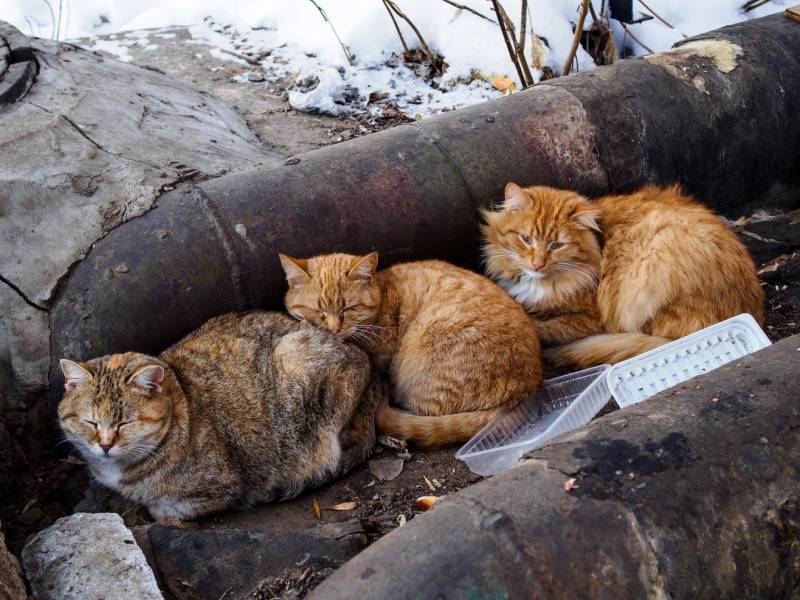

Conclusion
Even though kittens are oh-so-adorable, there are already many without homes in the world. Cats can get pregnant very shortly after having a litter. If your cat keeps reproducing, this might only add to the problem of many loving cats ending up in shelters. To combat this problem, discuss spaying with your vet.
Spaying a cat is better in the long run. Not only can it decrease the homeless population, but it can also decrease the likelihood of your cat developing behavioral and health issues related to being intact.
Featured Image Credit: Tiplyashina Evgeniya, Shutterstock







